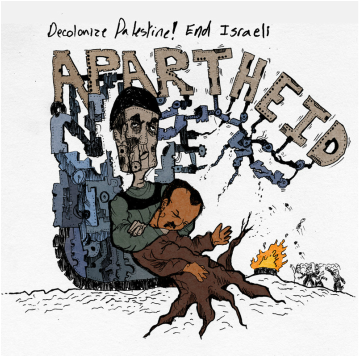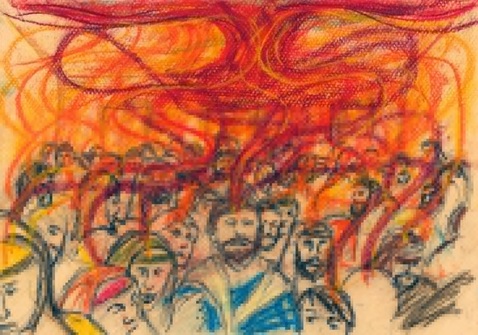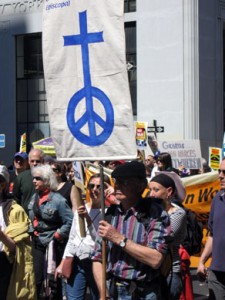|
By: Gregory Williams  Last month, I played a support role in an anti-zionist protest of a Friends of the IDF fundraiser in Westport, Connecticut. The action unexpectedly ended in arrest, and, somewhat more predictably, was the occasion for a fierce back-and-forth in local newspapers and blogs about the IDF, the Occupation of Palestine, and the importance/inappropriateness of trying to disrupt Zionist events. My small contribution to this debate was an editorial that was circulated on several blogs and two local newspapers. In the piece, I did what I have done in several posts on Jesus Radicals and discussed Zionism as a racist, white supremacist ideology. This message, to my surprise, was almost more controversial than the initial direct action. At the time, I saw no need to defend the claim that the conversation about Zionism is, by necessity, a conversation about race. This was clearly an error on my part, given the reaction that this claim received, not only from Zionist critics, but also from skeptical supporters. It is, I have been reminded, far more common to talk about the Occupation in terms of war and peace, or human rights than in terms of race. I am not necessarily writing to change this, or to criticize other anti-zionists in any way. The last thing that our movement (or any movement) needs is a public spat over tactics or rhetoric. I wholeheartedly support anyone working for a future in which no mother is forced to give birth at a checkpoint, no child is labeled as a demographic threat from birth or forced to grow up at the point of a gun, and in which no family lives in fear of their home being destroyed by a bomb or a bulldozer. Our work is far more important than the words with which we justify it. Nonetheless, I am conscious, at this juncture, of the need to step back for a moment and offer an account of why I use the language of race to talk about Zionism.
Comments
3/5/2015 Comments Charismatic Public ActionsBy: Nichola Torbett  This is not one of those blog posts in which I share something nifty that I have all figured out. (I should probably be suspicious of those, anyway, as a recovering “knower." Instead, I’m coming to the Jesus Radicals community with a question that I hope you will help me answer in the comments: What would it look like to invite the Holy Spirit to show up more powerfully and charismatically in our public actions as Christians? I don’t know about you, but I have been to my fair share of faith-based social justice vigils around any number of social issues, and while I deeply appreciate the opportunity to gather with like-minded people of faith and believe that doing so lends significant legitimacy to the causes we are there to witness to, I almost always leave feeling we have missed an opportunity to bring the full repentance-inducing power of God into the situation—the power to seize people, move them, pick them up and set them going in a different direction . I think about the descent of the Spirit on that first Pentecost—a dramatic public event that could be considered a direct action; certainly it was perceived as a threat to the ruling powers—and how effective it was in calling new people out of collaboration with empire and into participation in the Kingdom or Kindom of God. And isn’t that what we want our social justice actions to do? 11/28/2011 Animal Liberation: The Missing Piece Rather than individualized battles, the view of social anarchism encourages us to see struggles as interconnected, and to act appropriately by building alliances and solidarity between them. . . . Yet while social anarchism has been at the forefront of challenging many oppression, most social anarchists have not been very active—either historically or presently—in challenging the human domination of animals.1 On a day like Thanksgiving, when various charred and mutilated bodies lay strewn across millions of American tables, the feeling that is foremost in my heart is not one of gratitude, but of mourning and even anger. That the average person sees no disconnect between centering thanks and grace around death is unsurprising. That this disconnect remains an oversight or rejected outright in radical Christian and anarchist circles is more confusing. Like Bob Torres, anarchist and vegan author of Making a Killing: The Political Economy of Animal Rights, I contend that lack of careful and ongoing attention to nonhuman animal liberation leaves one of the most obvious and persistent forms of oppression unchallenged. Furthermore, it also makes for incomplete and disjointed analysis around other forms of oppression and resistance. Below are a few thoughts on important movements that miss the animal liberation piece and the consequences of that omission.  Editor’s Note: Make sure to read parts one, two, and three before this last part in Dan Oudhorn’s series challenging the somewhat flimsy ways we’ve tried to embrace the way of Jesus even as we accommodate the “death-dealing powers of our day.” Be forewarned–this is the most provocative part of the series. All too often, those involved in Christian communities are so solely focused upon enacting a creative, life-giving alternative that they end up neglecting the concomitant work of resistance to the death-dealing powers of our day. This is a point I have inherited from cultural theorists and philosophers like Jean-Paul Sartre, Michel Foucault, and Jacques Derrida. If, in the context of death, we wish to participate in something that is new and life-giving, then we must simultaneously, if not first of all, engage in the destruction of that which is death-dealing. So, for example, taking feminism seriously requires us to not only ensure that women and men are accorded the same status and judged by the same standards; it also requires us to abolish previous structures, attitudes, and discourses that were patriarchal and androcentric. Or, to take a second example, we can see how the worship of YHWH necessarily requires the Israelites to destroy their idols in the Old Testament, and necessarily requires Jesus to overturn the tables of the moneychangers in the New Testament. Therefore, if we are hoping to be involved in communities of new creation, committed to life, love, solidarity, and justice; then we must also be committed to resisting and destroying that which is given over to death, hatred, alienation and injustice. It is not enough for us to simply focus upon being a creative alternative to the status quo. We must also attack the status quo. Doing so does not mean that we have given in to a “false soteriology”. I once thought this, given the way I have been influenced by the Duke School and scholars like Stanley Hauerwas and William Cavanaugh. Both Hauerwas and Cavanaugh have made convincing arguments that liberal democracies operate with a false soteriology and look to the State for salvation… when in actuality salvation is found in Christ and in the Spirit-empowered community of those who follow him.  Editor’s Note: This is the first of a four part series by Dan Oudshoorn exploring some obstacles (and possibilities) in creating liberated communities. In this series, Dan offers a hearty challenge to our rather bourgeois attempts of living into the root of Jesus’ kingdom. It seems particularly appropriate for the Lenten season. I would like to begin by reading a passage from Slavoj Žižek’s recent defense of communism in light of the failures of democratic liberalism and the horrors of global capitalism. This passage relates a joke that isn’t funny (and I warn you–it is vulgar) but it hammers home a point that I hope will be taken very seriously by those of us gathered here today. Let me quote Žižek: In the good old days of Really Existing Socialism, a joke popular among dissidents was used to illustrate the futility of their protests. In the fifteenth century, when Russia was occupied by Mongols, a peasant and his wife were walking along a dusty country road; a Mongol warrior on a horse stopped at their side and told the peasant he would now proceed to rape his wife; he then added: “But since there is a lot of dust on the ground, you must hold my testicles while I rape your wife, so that they will not get dirty!” Once the Mongol had done the deed and ridden away, the peasant started laughing and jumping with joy. His surprised wife asked: “How can you be jumping with joy when I was just brutally raped in your presence?” The farmer answered: “But I got him! His balls are covered in dust!” This sad joke Žižek goes on to say] reveals the predicament of the dissidents: they thought they were dealing serious blows to the party nomenklatura, but all they were doing was slightly soiling the nomenklatura’s testicles, while the ruling party carried on raping the people… |
Disclaimer
The viewpoints expressed in each reader-submitted article are the authors own, and not an “official Jesus Radicals” position. For more on our editorial policies, visit our submissions page. If you want to contact an author or you have questions, suggestions, or concerns, please contact us. CategoriesAll Accountability Advent Anarchism Animal Liberation Anthropocentrism Appropriation Biblical Exegesis Book Reviews Bread Capitalism Catholic Worker Christmas Civilization Community Complicity Confessing Cultural Hegemony Decolonization Direct Action Easter Economics Feminism Heteropatriarchy Immigration Imperialism Intersectionality Jesus Justice Lent Liberation Theology Love Mutual Liberation Nation-state Nonviolence Occupy Othering Pacifisim Peace Pedagogies Of Liberation Police Privilege Property Queer Racism Resistance Resurrection Sexuality Solidarity Speciesism Spiritual Practices Technology Temptation Veganism Violence War What We're Reading On . . . White Supremacy Zionism ContributorsNekeisha Alayna Alexis
Amaryah Armstrong Autumn Brown HH Brownsmith Jarrod Cochran Chelsea Collonge Keith Hebden Ric Hudgens Liza Minno Bloom Jocelyn Perry Eda Ruhiye Uca Joanna Shenk Nichola Torbett Mark VanSteenwyk Gregory Williams Archives
October 2017
|
Search by typing & pressing enter

 RSS Feed
RSS Feed